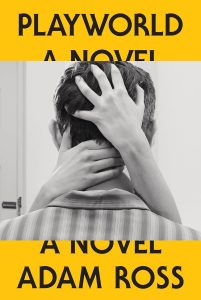Knopf
Review by Walter Cummins

In Adam Ross’s Playworld, Griffin Hurt, the narrator, depicts a collection of situations he lived through during his years from middle school until early high school. Much happens to him, as he relates in richly dramatized sections about events and his reactions. But as much as he feels what is happening to him, at an essential level he is detached from it because he does not understand what it means or, crucially, who he is. His experiences are self-contained. Griffin is unable to connect them into a unified understanding of his life and does not grasp that that should be his quest if he is to escape his deep loneliness.
Ross has written a unique bildungsroman of an appealing boy-young man involved in a variety of activities that he fails to understand. He is deeply involved in some and blandly indifferent to others that would have fulfilled fantasies for most others. An example of that is his ongoing acting role in a television series for children that leads to a more prestigious one in a feature film. He is told how talented an actor he is, a natural, but he regards acting as an obligation, a job to fulfill. It gives him little satisfaction beyond checking off another duty on his schedule.
What does engage him most is being a member of his private school wrestling team, almost to the point of obsession as he wears rubber sweatsuits and starves himself to fit into his weight category limit. Several of the novel’s fullest sections are devoted to his training, to his matches, and to his relationship with a coach he doesn’t realize is abusive. He also has an intense involvement with mastering the game of Dragons and Dungeons, but that has much less attention in the novel.
Wrestling and Dragons and Dungeons are games that engage his enthusiasm. Even his physical relationship with Naomi, an older woman of his parents’ set, who kisses and caresses him in the backseat of her expensive car, something he deeply needs without understanding why, is in effect an enticing game. What really involves him are the diversions behind the novel’s title—Playworld. Griffin is only playing at life, rarely thinking beyond the immediacy of surface challenges.
The novel’s adults are hardly role models, not positive examples of a maturity Griffin can seek to emulate. He does care about his parents—his father a performer with strong voice for singing and voiceovers, his mother a former ballet dancer. They also care for him, but their shaky marriage occupies more of their attention, as does their need for money to maintain their life style with much wealthier associates. His father does give him an understanding of man-woman love and a crucial piece of advice at a critical turning point. But for the most part the adults around him are absorbed in playing their own form of games.
His affection for his younger brother is complex because of their essential differences. Griffin’s teachers, friends, and the girls he is interested in are all complexly characterized, each adding to the burden of making sense of his life whether they mean it or not.
The time setting of the novel—the transition between the Carter and Reagan years well captured by Ross—underlies the social setting of Griffin’s adolescence, as does the New York he inhabits, with Ross’s depicting the feel of the upper west side streets and buildings.
The novel opens with Griffin as a child playing in a coat closet with younger brother , Oren, and accidentally setting a fire that destroys the family apartment. He ruined his home because of playing. His buried guilt plays a role throughout as it relates to the issue of whether his adult life will turn out to be another calamity.
Griffin’s central dilemma is that he is a fragmented young man, shifting from world to world, game to game. He does not how to connect them and become a whole person. Ross emphasizes this confusion in the structure of the novel, each episode self-contained, only those about the same specific aspect of Griffin’s life connected while divorced from episodes about other aspects. Griffin unconsciously keeps them separate, rarely telling the people in each part of his life what is going on in any of the others. He is unable to unify all that is happening to him.
With Elliott, his therapist, he opens up a bit and then holds back before addressing the real issues. His most confessional openness is with Naomi, despite their great age difference, as she invites him to reveal. But that relationship itself he cannot talk about with anyone from any other part of his life.
In the latter pages of the novel, as Griffin begins to understand more and more, he has a significant illumination: “The truth is that it would have never occurred to me then to share the things I’d seen and done, any more than discussing Kepplemen [his first wrestling coach], because our lives were so atomized, because we lived so unattended, because we were already so strangely private, access to each other’s inner lives did not come naturally.”
Knowing that, what can he do with his own atomized life? Can he become a whole person? The novel’s conclusion dramatizes how he addresses this new awareness.
